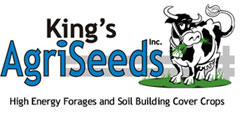
A recent article cited a “$500/cow/year spread in the feed cost among dairies”. Your highest expense by far is your feed cost. How much difference can you make by feeding high quality, home grown forages and grains? - Farmshine, Volume 9, Number 15—”Cash flow is No.1 concern on dairy farms”

King’s AgriSeeds 2018 winter forage meetings will focus on how to manage a thriving operation in the face of mounting adversity, from weather and climate to economic impacts. Start alleviating these harsh conditions right on your own soil, beginning with the seeds you plant. Learn how to diversify cropping options and maximize high energy forages. Maintain profitability and even improve your bottom line. Diversification with alternative forages, including summer annuals, winter annuals, mixes boosts the resilience of livestock systems, and cover crops help build soil health.
New York Series: January 31 - Randolph, NY; February 1 - Geneva, NY; February 2 - Richfield Springs, NY
Managing around Weather and Climate Change
Alison Chatrchyan, Cornell Institute for Climate Smart Solutions
Better Soils = Better Forages
Dr. Quirine Ketterings, Nutrient Management Spear Program, Cornell University
Soil Health Impact on Farm Profitability
Harold, Schrock, Cayuga Ag/King’s AgriSeeds
Improved Performance with MC Corn
Scott Harris, Masters Choice
Pennsylvania/ Virginia Series: February 6 – State College, PA; February 7 – Kinzers, PA; February 8 – Staunton, VA
Identifying Wealth Creation Opportunities for Dairy Producers
Dr. David Galligan, VMD, MBA
Key Performance Indicators to Maximize Income Over Feed Cost
Dr. Joe Bender, DVM, MS
Weathering Water Extremes in the Changing Climate
Dr. Anthony Buda, Co-Director of the USDA Northeast Climate Hub
Improved Performance with MC Corn
Kevin Koone, Masters Choice
GUEST SPEAKER PROFILES:
Allison Chatrchyan - As the Director of the Cornell Institute for Climate Change and Agriculture, and a Senior Research Associate in the departments of Development Sociology and Earth and Atmospheric Sciences, Allison Chatrchyan’s work focuses at the interface between social, environmental and agricultural systems. She works to facilitate interdisciplinary research and extension teams that are co-developing resources and tools for sustainable agriculture and climate change adaptation and mitigation.
Dr. Quirine M. Ketterings - Quirine initiated and leads the Cornell Nutrient Management Spear Program, the applied research and extension program in nutrient management of field crops of the College of Agricultural and Life Sciences. Through this program, she works to improve grower and agricultural industry awareness of crop nutrient needs, crop quality, management of organic amendments, environmentally sound nutrient management practices, and overall soil fertility management in New York State, and provide methods and tools to integrate and apply accumulated knowledge about crop nutrient guidelines to optimize crop yield while minimizing risk to the environment.
David Galligan, VMD, MBA, is Professor of Animal Health Economics at the University of Pennsylvania, School of Veterinary Medicine. He is the director of the Center for Animal Health and Productivity at the Veterinary School. Dr. Galligan’s major interest is in improving the decision-making abilities of consultants and producers in the dairy industry.
Joseph Bender, DVM, MS - Assistant Professor of Clinical Dairy Production Medicine at the University of Pennsylvania, School of Veterinary Medicine. Dr. Bender grew up on a dairy farm in Lancaster County, Pennsylvania before completing his DVM and MS from Iowa State University in 2010. Dr. Bender’s main area of work involves providing on-farm consultation to dairy farmers throughout Pennsylvania to increase production and profitability.
Dr. Anthony Buda - Co-Director of the USDA Northeast Climate Hub. Dr. Buda’s interest and expertise center on the potential effects of climate change on watershed hydrology and water quality. Dr. Buda is also a Research Hydrologist with the USDA Agricultural Research Service (ARS) Pasture Systems and Watershed Management Research Unit in University Park, PA.





